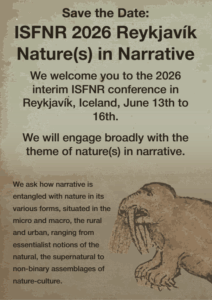CALL FOR PAPERS – ‘Folklore on the Move’
The Folklore Society’s Annual Conference 2026, in collaboration with the Elphinstone Institute, University of Aberdeen.
In-person conference: Friday, 5 June to Sunday, 7 June 2026, at the King’s College, University of Aberdeen, Scotland.
Online conference day: Wednesday, 10 June 2026.
The vitality of folklore depends on the movement of people and/or ideas. Some forms of folklore can be defined directly through their relations to movement, whether practically – e.g. certain cultural forms of Roma and Traveller communities, migrants, showpeople, sailors, etc. – or performed, e.g. tales of years-long quests, ballads of departure, or myths whose characters move between supernatural and physical realms. We can also consider the movement of individual items: a lullaby moves intimately from one generation to another; an online meme is sent to thousands via social media; a tag is spray-painted across a city; dance steps are called from the stage as partners and groups move around the floor.
The movement of disciplinary ideas and methodologies and how these have shaped Folklore and adjacent fields is worthy of contemplation, as well. More specifically, the connection between folklore and movement has interested folklorists going back at least to Julius Krohn’s historic-geographic method, which attempted to track the movement of folklore across place and time. Later, Reidar Christiansen pointed to the migratory nature of legends, while Carl von Sydow reminded us of the cultural changes that folklore undergoes as it moves, and Linda Dégh considered the ‘conduits’ of interest that are necessary for the sharing of folklore.
At a time when folklore and related symbols have been co-opted by some to delineate stringent identity boundaries, the Elphinstone Institute and The Folklore Society are pleased to work together to highlight the movement of folklore and the interconnectedness of people. This is not to imply that all folklore is benevolent, nor to neglect the movement inherent to the discipline’s problematic colonial histories. We hope to encourage nuanced discussions of folklore and movement through a variety of lenses and from a wide range of participants.
We welcome academic and non-academic presentations of 20 minutes from tradition bearers, archivists, activists, museum workers, artists, event co-ordinators, folklorists and others interested in speaking on contemporary or historical aspects of ‘folklore on the move’.
Deadline for proposals: Sunday, 14 December 2025.
Read more here
